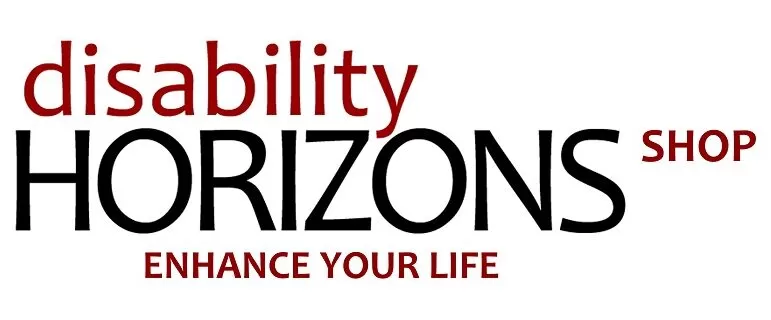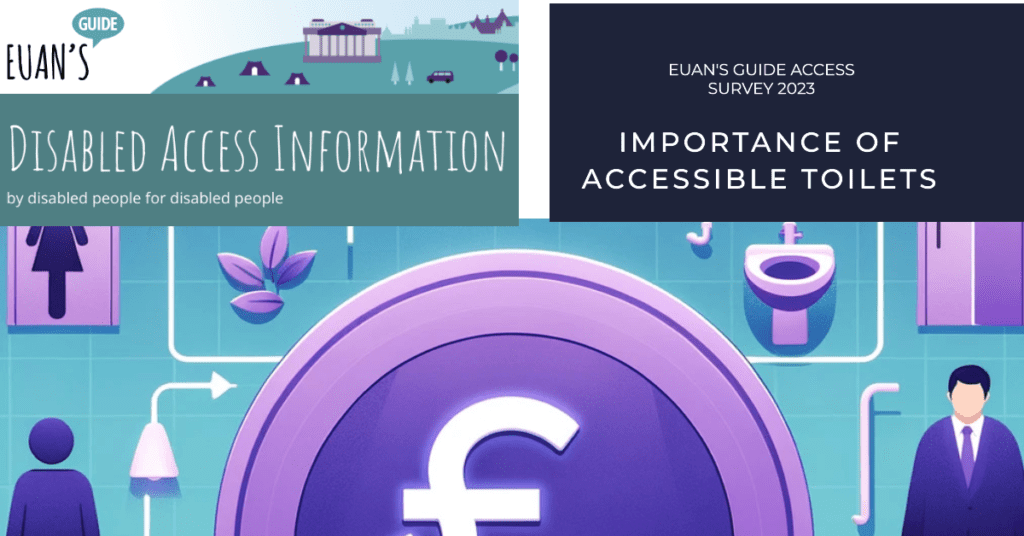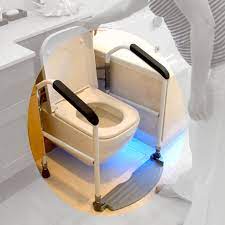Accessible Toilets: Unlock the Access
Each year, The Euan’s Guide Access Survey collects insights from disabled people, highlighting different issues of concern. It’s a key tool for improving access by revealing where facilities fall short. In this post we will focus on the issue of venues with inadequate toilet facilities.
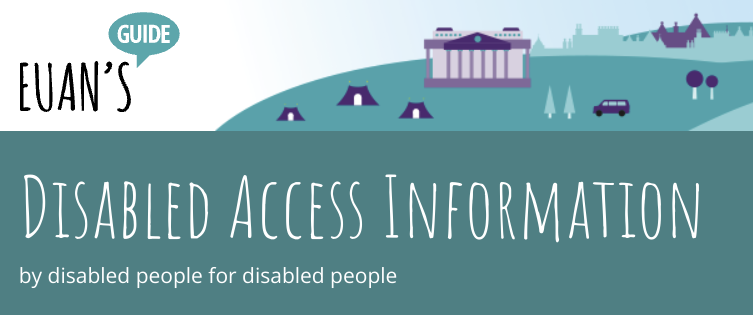 Accessible toilets are more than just a requirement; they are a fundamental aspect of inclusion and participation for disabled people in society. These facilities should be designed not only to meet basic compliance with laws and standards but to truly meet the needs and preferences of those who use them.
Accessible toilets are more than just a requirement; they are a fundamental aspect of inclusion and participation for disabled people in society. These facilities should be designed not only to meet basic compliance with laws and standards but to truly meet the needs and preferences of those who use them.
The importance of accessible toilets extends far beyond convenience, affecting the dignity, independence, and quality of life of disabled people.
They enable participation in social, recreational, and professional activities, making them indispensable for a truly inclusive society.
Key Takeaways Table Euan’s Guide Access Survey 2023
| Key Insights | Details |
|---|---|
| Importance of Accessible Toilets | Accessible toilets are crucial for the dignity, independence, and participation of disabled people in social activities. |
| Euan’s Guide 2023 Survey Findings | 91% of disabled people seek access information before visits, but 76% find it misleading; highlighting the need for accurate, detailed accessibility information. |
| Business Implications | Improving toilet accessibility can expand the customer base, enhance brand loyalty, tap into the spending power of disabled customers, and fulfil corporate social responsibility. |
| Legal and Ethical Requirements | Compliance with the Equality Act 2010 and standards like BS8300 and Approved Document M is just the starting point for true accessibility. |
| Designing for True Accessibility | Features like spacious interiors, grab rails, accessible sinks, and clear signage are essential for truly accessible toilets. |
| Management and Maintenance | Regular cleaning, avoiding restricted access, disability awareness training, and user-centred consultation are key to maintaining accessibility. |
| Innovative Products for Accessibility | Products like portable toilet frames, radar keys, personal urinals, and hygiene aids can significantly improve accessibility. |
| The Role of Accessible Toilets in Inclusion | Truly accessible toilets are indispensable for an inclusive society, enabling the full participation of disabled people. |
Key Findings From Euan’s Guide Access Survey 2023 Regarding Accessible Toilets:
- 91% of respondents try to find disabled access information before visiting a new place, yet 76% have found information on venues’ websites to be misleading or inaccurate
- Top barriers encountered include lack of accessible transport (67%), not enough space in venues (63%), and no access to a suitable toilet (41%)
- 71% have come across an accessible toilet they couldn’t use, with key problems being lack of space (42%), dirty facilities (67%), and obstructed transfer spaces (24%)
- 76% have avoided going somewhere because it didn’t have an accessible toilet and 49% because there was no information available about accessible facilities
The full report can be accessed here.
The Concerns Disabled People Have before Visiting Venues
The Euan’s Guide Access Survey 2023 revealed critical insights into the state of accessible toilets and the broader implications for accessibility and inclusion.
An overwhelming 91% of respondents indicated they try to find access information before visiting new places, yet 76% found this information to be misleading or inaccurate. The survey highlighted that lack of accessibility remains a major barrier, with common issues including inadequate space, poor cleanliness, and insufficient or inaccurate information.
Importance of Accessibility
These findings underscore the critical role accessible facilities play in the social inclusion of disabled people and suggest that many businesses may be underestimating the value of disabled customers.
Strategies for Improving Accessibility
Compliance vs. True Accessibility
To address these challenges, businesses must go beyond mere compliance with legal requirements. They should actively strive to understand and implement the principles of true accessibility in their facilities.
Legal Requirements and Standards
The Equality Act 2010 mandates reasonable adjustments to prevent disabled people from being at a substantial disadvantage.
This includes ensuring accessible toilets meet specific standards. The British Standard BS8300, along with Approved Document M of the Building Regulations, provides detailed guidance on designing accessible environments, including toilets. These documents outline the minimum standards for space, facilities, and features necessary to create accessible toilets but achieving true accessibility often requires going beyond these minimum standards.
Designing for True Accessibility
“Most accessible toilets facilities are inaccessible as they don’t have powered doors thus preventing many disabled from accessing the facilities at all. For instance if you have a leg that permanently protrudes from your wheelchair or only have one arm, then you can’t get the doors open to be able to enter. ” Derek – Newsletter Subscriber
Designing for true accessibility involves considering a range of features that make toilets usable and comfortable for disabled people:
- Spacious interior to allow room for manoeuvring, including for those using mobility aids.
- Grab rails strategically placed for support, and contrasting toilet seats for visibility.
- Accessible sinks, soap dispensers, and mirrors at appropriate heights.
- Changing benches in Changing Places toilets for those who need them.
- Clear signage and directions to and within the facilities.
Management for Inclusion
Effective management practices are crucial for ensuring the accessibility and usability of toilets:
- Regular cleaning and maintenance to keep the facilities in good condition.
- Avoiding restricted access, for example by using radar keys, which can be a barrier for some disabled people.
- Providing disability awareness training for staff to ensure they understand the needs of disabled visitors.
- Engaging in user-centred consultation to understand the needs and preferences of disabled people.
The Business Case for Accessibility:
“Businesses are undervaluing disabled people, in both social inclusion and spending power.” – Euan MacDonald, Access Survey Report 2023
 Improving accessibility facilities, such as toilets, is not only a matter of compliance or ethics; it’s a sound business decision. The Euan’s Guide Access Survey 2023 provides compelling data that underscores the business value of investing in accessibility.
Improving accessibility facilities, such as toilets, is not only a matter of compliance or ethics; it’s a sound business decision. The Euan’s Guide Access Survey 2023 provides compelling data that underscores the business value of investing in accessibility.
Accessibility is beneficial for businesses:
Expanded Customer Base
Disabled people actively seek out access information before visiting new places.
However, a large percentage finds this information misleading. By providing accurate, detailed, and transparent accessibility information, businesses can attract a wider audience, including the disabled community, their families, and friends. This not only increases the customer base but also fosters loyalty among customers who feel their needs are understood and valued.
Enhanced Reputation and Brand Loyalty
Businesses that go above and beyond to ensure their facilities are genuinely accessible are likely to see an improvement in their reputation.
Word of mouth in the disabled community, as well as positive mentions in accessibility reviews and guides, can enhance a business’s standing. A strong reputation for inclusivity can increase brand loyalty, with customers choosing your business over competitors due to your commitment to accessibility.
Increased Spending Power
The survey’s findings highlight a crucial point: businesses often underestimate the spending power of disabled customers. The Purple Pound – the spending power of disabled people and their households – is substantial. By catering to the needs of disabled people, businesses tap into a market with significant spending power, which can lead to increased sales and revenue.
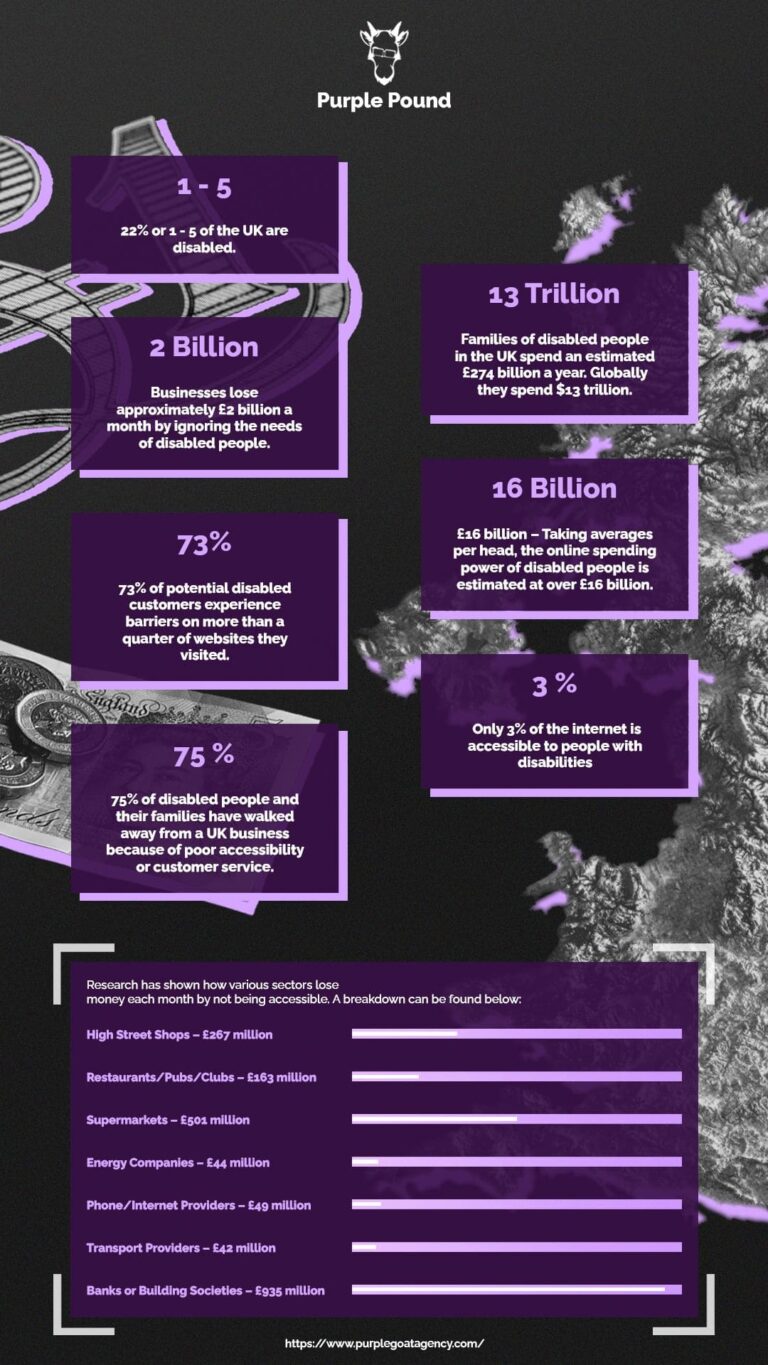
Graphic Description:
The image has a dark background with a map of the UK and money graphics. At the top is the Purple Goat, goat head logo and the title ‘Purple Pound’. Overlayed are the most recent statistics relating to the Purple Pound. In seven purple boxes with lilac edges are the statistics:
- 1-5: 22% or 1-5 of the UK are disabled
- 2 Billion: Businesses lose approximately £2 billion a month by ignoring the needs of disabled people.
- 13 trillion: Families of disabled people in the UK spend an estimated £274 billion a year. Globally they spend $13 trillion.
- 16 billion: taking average per head, the online spending power of disabled people is estimated at over £16 billion
- 73% – 73% of potential disabled customers experience barriers on more than a quarter of the websites they visit.
- 75% – 75% of disabled people and their families have walked away from a UK business because of poor accessibility or customer service.
- 3% – Only 3% of the internet is accessible to people with disabilities.
Below is a line chart showing how various sectors lose money each month by not being accessible:
- High street shops – £267 million
- Restaurants/Pubs/Clubs – £163 million
- Supermarkets – £501 million
- Energy companies – £44 million
- Phone/Internet providers – £49 million
- Transport providers – £42 million
- Banks or building societies – £935 million
At the bottom is the Purple Goat website link.
Legal Compliance and Risk Mitigation
While the primary focus of improving accessibility should be on inclusion and customer experience, there is also a practical business case for compliance. Adhering to legal requirements such as the Equality Act 2010 and standards like BS8300 and Approved Document M helps businesses avoid legal risks and potential fines.
Moreover, it demonstrates a commitment to corporate social responsibility.
Improved Customer Experience for All
Accessibility improvements, particularly in facilities like toilets, benefit not just disabled customers but everyone.
Features such as spacious interiors, grab rails, and easy-to-use fixtures enhance the customer experience for older people, families with young children, and those with temporary injuries. An inclusive environment can thus improve overall customer satisfaction.
Long-Term Cost Savings
Investing in accessibility can lead to long-term cost savings.
For example, incorporating accessible design features during initial construction or renovation is more cost-effective than retrofitting. Additionally, businesses that are known for their accessibility may see reduced marketing costs due to positive word-of-mouth and higher customer retention rates.
Funding a changing places toilet
There is information about how to raise funds for works to create a more accessible toilet for your organisation or business here.
Social Inclusion and Corporate Responsibility
Finally, there is a social and ethical case for improving accessibility. Businesses play a crucial role in promoting social inclusion. By ensuring their facilities are accessible, they contribute to a society where disabled people can participate fully in social, economic, and cultural life. This not only enhances the quality of life for disabled individuals but also aligns with broader corporate responsibility goals towards creating an inclusive society.
It’s clear that improving accessibility is not just the right thing to do; it’s a smart business strategy.
Accessible toilets help everyone take part in society
Designing for true accessibility in toilets is not just about meeting legal requirements; it’s about understanding the diverse needs of disabled people.
